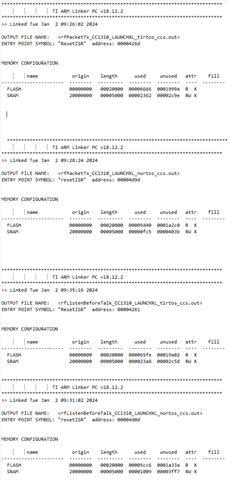Other Parts Discussed in Thread: CC1101, , SIMPLICITI
TI RF Team,
Our customer has interest in moving their RF application from MSP430 + CC1101 to CC1310 but has concerns about squeezing into the Flash memory space of the CC1310 (32KB target Flash size).
[CUSTOMER]
We have 16KB of firmware + driver running the CC1101 currently. If we switched to the CC1310, would we need to use a TI software stack that would add extra code? I just want to be sure our application plus any TI software used on the CC1310 will fit in the 32KB or 64KB of flash space provided.
[TI]
Just to first level set. Just please clarify what (stack) would run on the CC1310 specifically?
In terms of code size comparison, although there is no hard set rule between MSP430 and ARM, keep in mind the MSP430 uses the proprietary 16-bit core to squeeze into potentially smaller memory footprints, whereby the 32-bit ARM cores (M3, M4, etc) can perform better but may use slightly more code space. There are a lot of papers and such out there such as this (below) which probably talk to maybe 15-20% general rule of thumb (adder for ARM code size). For example, this particular paper talks to a 19% advantage for 16-bit MSP430 vs. ARM M3.
We have very small sub1G stacks that typically squeeze into 10s of Ks of code space, few K or RAM. (TI legacy SimpliciTI RF stack used Ks of Flash and 100s bytes RAM).
We also have BLE devices with the Stack in ROM (~80KB) meaning only ~8-10KB are needed for application (API, driver calls, etc).
CC1101 Transceivers are hosted in external MCUs anyway (such as MSP430) so may be a null point after all ? (ie 16KB on MSP430 equating to say ~20KB on CC1310…?)
But again, if comparing MSP430 + CC1101 to CC1310 stand-alone, I don’t anticipate that we’d have a big memory issue or concern overall. Plus, the CC13xx family offers some P2P compatible options with larger memory sizes also.
[CUSTOMER]
there’s going to be radio control software that comes with the SDK for the CC1310. Similar to the “empty” or “basic” projects for the CC2340 (that we are already aware of). The size of those projects is roughly what I’d consider “stack” or extra code and API that TI provides that our code needs to call for radio operation. I think you kinda answered it below that were looking at “10s of Ks of code space, few K or RAM. (TI legacy SimpliciTI RF stack used Ks of Flash and 100s bytes RAM).”
There’s some folks casting doubt on whether our currently 16K CC1101-based application firmware is going to fit in 32K on a CC1310. I’d like to figure that out pretty quick.
[TI]
So we may need to lean on the E2E Forums which will still be monitored by TI over the holiday break (if urgent enough on your end)…
We there with this thread will initiate an E2E thread for this inquiry and perhaps even share code (separately from E2E)?
Lastly, if a user had both CC1101 and CC1310 HW today (even LaunchPads for CC1310…)…and if so could run a quick test using perhaps the SimpliciTI stack?
SIMPLICITI Driver or library | TI.com [ti.com]
We may need our LPRF team’s support on this, which I’m just afraid won’t be ‘pretty quick’ given Christmas is now 3 days away.
Thank you for your patience over the holiday break.
TY,
CY


